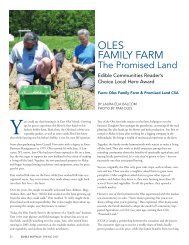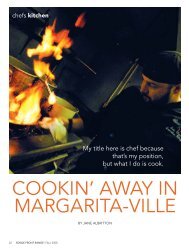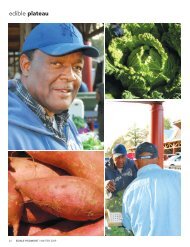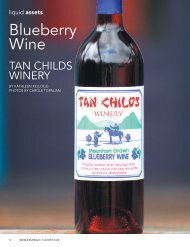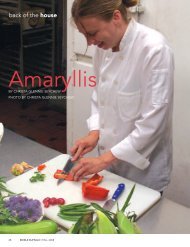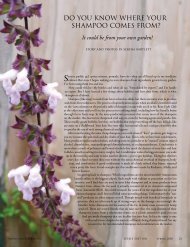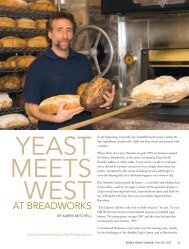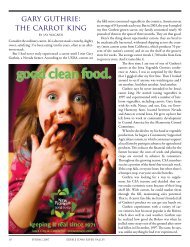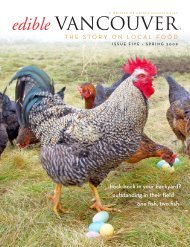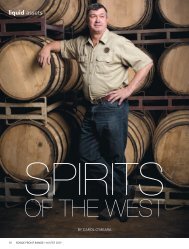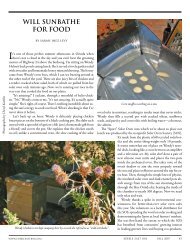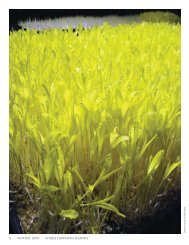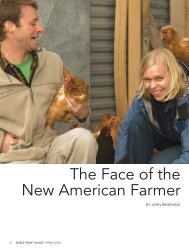The pleasure of eating - Edible Communities
The pleasure of eating - Edible Communities
The pleasure of eating - Edible Communities
You also want an ePaper? Increase the reach of your titles
YUMPU automatically turns print PDFs into web optimized ePapers that Google loves.
Only by growing some food<br />
for yourself can you become acquainted<br />
with the beautiful energy cycle that revolves<br />
from soil to seed to flower to fruit to food<br />
to <strong>of</strong>fal to decay, and around again.<br />
<strong>The</strong> last suggestion seems<br />
particularly important to me. Many<br />
people are now as much estranged<br />
from the lives <strong>of</strong> domestic plants<br />
and animals (except for flowers and<br />
dogs and cats) as they are from the<br />
lives <strong>of</strong> the wild ones. This is<br />
regrettable, for there is such <strong>pleasure</strong><br />
in knowing them. And farming,<br />
animal husbandry, horticulture, and<br />
gardening, at their best, are complex<br />
and comely arts; there is much<br />
<strong>pleasure</strong> in knowing them, too.<br />
It follows that there is great<br />
dis<strong>pleasure</strong> in knowing about a<br />
food economy that degrades and<br />
abuses those arts and those plants<br />
and animals and the soil from<br />
which they come. For anyone who<br />
does know something <strong>of</strong> the modern history <strong>of</strong> food, <strong>eating</strong> away from<br />
home can be a chore. My own inclination is to eat seafood instead <strong>of</strong><br />
red meat or poultry when I am traveling. Though I am by no means a<br />
vegetarian, I dislike the thought that some animal has been made<br />
miserable in order to feed me. If I am going to eat meat, I want it to<br />
be from an animal that has lived a pleasant, uncrowded life outdoors,<br />
on bountiful pasture, with good water nearby and trees for shade. And<br />
I am getting almost as fussy about food plants. I like to eat vegetables<br />
and fruits that I know have lived happily and healthily in good soil,<br />
not the products <strong>of</strong> the huge, bechemicaled factory-fields that I have<br />
seen, for example, in the Central Valley <strong>of</strong> California. <strong>The</strong> industrial<br />
farm is said to have been patterned on the factory production line. In<br />
practice, it looks more like a concentration camp.<br />
<strong>The</strong> <strong>pleasure</strong> <strong>of</strong> <strong>eating</strong> should be an extensive <strong>pleasure</strong>, not that <strong>of</strong><br />
the mere gourmet. People who know the garden in which their<br />
vegetables have grown and know that the garden is healthy will<br />
remember the beauty <strong>of</strong> the growing plants, perhaps in the dewy first<br />
light <strong>of</strong> morning when gardens are at their best. Such a memory is one<br />
<strong>of</strong> the <strong>pleasure</strong>s <strong>of</strong> <strong>eating</strong>. <strong>The</strong><br />
knowledge <strong>of</strong> the good health <strong>of</strong> the<br />
garden relieves and frees and<br />
comforts the eater. <strong>The</strong> same goes<br />
for <strong>eating</strong> meat. <strong>The</strong> thought <strong>of</strong> the<br />
good pasture and <strong>of</strong> the calf<br />
contentedly grazing flavors the<br />
steak. Some, I know, will think <strong>of</strong> it<br />
as bloodthirsty or worse to eat a<br />
fellow creature you have known all<br />
its life. On the contrary, I think it<br />
means that you eat with<br />
understanding and with gratitude.<br />
A significant part <strong>of</strong> the <strong>pleasure</strong> <strong>of</strong><br />
<strong>eating</strong> is in one's accurate<br />
consciousness <strong>of</strong> the lives and the<br />
world from which food comes. <strong>The</strong><br />
<strong>pleasure</strong> <strong>of</strong> <strong>eating</strong>, then, may be the<br />
best available standard <strong>of</strong> our<br />
health. And this <strong>pleasure</strong>, I think, is pretty fully available to the urban<br />
consumer who will make the necessary effort. eGT<br />
Wendell Berry, born 1934, is a Kentucky-based writer and farmer<br />
who believes the good life includes sustainable agriculture, healthy<br />
rural communities, connection to place, the <strong>pleasure</strong>s <strong>of</strong> good food,<br />
husbandry, good work, local economics, the miracle <strong>of</strong> life, fidelity,<br />
frugality, and the interconnectedness <strong>of</strong> life. ©1990 by Wendell<br />
Berry. Reprinted by permission <strong>of</strong> North Point Press, a division <strong>of</strong><br />
Farrar, Straus and Giroux, LLC.<br />
Photo by Carole Topalian<br />
26 <strong>Edible</strong> Grande Traverse / Spring 2008 ediblegrandetraverse.com



